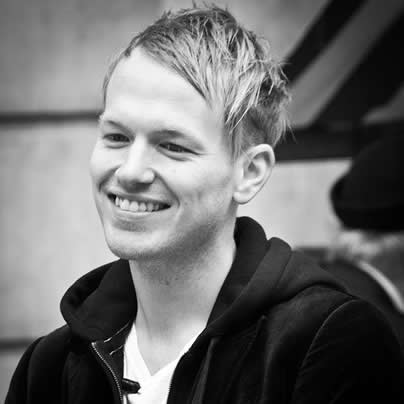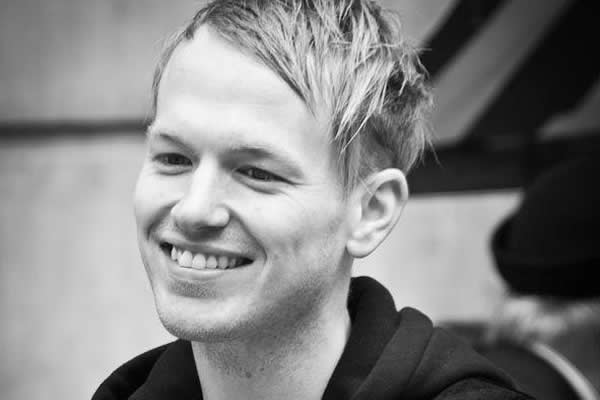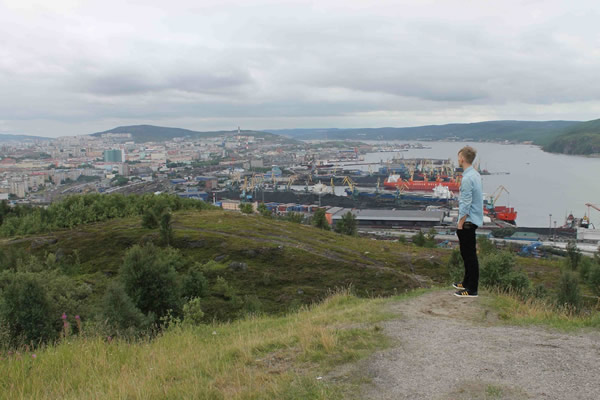News
Dutch activist recalls arrest under anti-gay Russian law
Claims police used anti-gay slurs, accused him of spying

One of the four Dutch LGBT rights advocates whom Russian authorities arrested in July told the Washington Blade he feels they wanted to use them as an example of what could happen to anyone who challenges the country’s gay propaganda to minors ban.
“They thought that we came there to make the Russian law or Russian authorities [look] ridiculous,” Kris van der Veen said during an interview from his home in the Dutch city of Groningen on Sept. 27. “It was not the case, but they think we were doing that.”
Van der Veen, 33, and three other Dutch LGBT rights advocates traveled to Murmansk to film a documentary about LGBT life in Russia. They interviewed members of Coming Out and the Russian LGBT Network and organizers of an LGBT film festival in St. Petersburg before they arrived in the city.
Groningen and Murmansk have been sister cities for nearly 25 years, and the coordinator of the program helped van der Veen and his colleagues secure a cultural visa that he said allowed them “start a dialogue about any subject with” the city’s residents. Van der Veen said it also permitted him and his fellow advocates to discuss homosexuality while in Russia because “it’s not specified.”
The trip also coincided with a year-long series of events that commemorated the 400th anniversary of friendship between Russia and the Netherlands.
“I thought, well I will go there, I will ask them about their lives and if the anti-gay law has any effect on their lives,” van der Veen told the Blade. “So that’s what I did.”
Van der Veen said he and a group of up to 20 others that included his fellow activists and their crew arrived at a summer camp in Murmansk on July 20.
He said he discussed Dutch LGBT advocacy efforts during a lecture he gave on human rights. Van der Veen said he also filmed some of the other seminars on the same topic – and interviewed a Russian teenager and her girlfriend.
Van der Veen said authorities detained him and his colleagues on July 21 as they tried to leave the camp and return to Murmansk to get footage of the city.
“I walked into this hallway and then when I turned the corner I saw about 15 police officers — men, women in uniforms, without uniforms — coming towards me,” he recalled. “They were also spreading into other hallways and rooms.”
Van der Veen said the officers told him in Russian that he had to return to the room “where the rest of the people were.” He said the Russian activists who had organized the human rights lectures “stood up for us” and began to speak with the authorities. In spite of these efforts, Van der Veen said immigration officials requested to see his and his colleagues’ passports and told them to go with them into another room.
Van der Veen told the Blade they interrogated him and the three other Dutch LGBT rights advocates for three hours. They subsequently received a fine of 3,000 rubles or roughly $93.
“We thought, OK we get a fine, it’s now over,” Van der Veen said. “Then they said there are also police officers [who] want to talk to you.”
He said uniformed police officers and others whom he described as KGB agents questioned them for another five hours. Van der Veen categorized one of the officials as “very provocative.”
“The first thing he said was, this is a police hat. You can wear it and I can take a picture of you,” he said, noting the officer was standing less than a foot in front of him. “I couldn’t say no, but I had to say no because I think otherwise I would make fun of the Russian authorities if I would take the hat and put it on my head. He also said I can take a picture of you.”
Van der Veen said the authorities referred to him as a spy and used unspecified anti-gay slurs against him while in custody. He told the Blade they said the teenager whom he interviewed for his documentary was a minor.
“She was already a part of the LGBT community in Murmansk,” van der Veen said. “They were already out of the closet… so I wasn’t doing any propaganda towards minors.”
Van der Veen said authorities also asked him whether he told people to “become gay because it’s good to be gay.”
“I was laughing because I thought it was a ridiculous question,” he said.
Van der Veen said the authorities released him and his fellow advocates at 11 p.m. on July 21 — eight hours after they initially detained them. He told the Blade they ordered them to go to court the next morning, even though they did not obtain a warrant to arrest them.
Van der Veen said he and his colleagues thought they could leave the city and return to the Netherlands after 5 p.m. on July 22 because a judge had yet to hear their case. He said Russian police officers who had called him 20 times told them they had to go to a Murmansk hotel and explain the contents of the hard drive that had been taken from them at the summer camp the previous day.
Van der Veen told the Blade the Dutch Ministry of Foreign Affairs told him and his colleagues to leave the country as soon as possible. The six police officers whom he said met them at the airport told them to go to “a certain address in Murmansk” the next day.
“They wanted to keep us there, but we didn’t sign anything because the consulate said we have rights, we have the right to talk to a lawyer and to have a translator in our own language,” van der Veen said. “We pressed and pressed on that. It was very scary because of the look in their eyes… there’s no dialogue.”
Van der Veen said the Dutch consulate in St. Petersburg received a letter upon his return to the Netherlands that he and his colleagues could not return to Russia for three years. He added police spoke with the Murmansk-based coordinator of the sister city program with Groningen on several occasions.
Van der Veen described these visits as “very provocative.”
“Police officers were very angry that we came there,” he said. “They were telling us on Sunday [July 21] that our government should tell us about Russian laws and about the anti-gay laws and that we can’t do this like we were 7-year-olds.”
The Murmansk incident coincided with mounting outrage over the gay propaganda law that President Vladimir Putin signed less than a month before van der Veen and his colleagues traveled to the city.
The Dutch LGBT advocacy group COC Nederland, President Obama and retired tennis champion Martina Navratilova are among those who have publicly criticized the Kremlin over the statute and its overall gay rights record. Others, including actor and playwright Harvey Fierstein, have called for a boycott of the 2014 Winter Olympics that will take place in Sochi, Russia, in February.
Van der Veen told the Blade he does not support a boycott of the Sochi games.
“If there’s an opportunity to go [to Russia] I think we should go there, use our influence, our contacts to give a global stage to the topic of equal rights and also LGBT people in Russia,” he said.
He said he plans to finish the documentary by the end of November.
District of Columbia
D.C. Black Pride theme, performers announced at ‘Speakeasy’
Durand Bernarr to headline 2026 programming

The Center for Black Equity held its 2026 DC Black Pride Theme Reveal event at Union Stage on Monday. The evening, a “Speakeasy Happy Hour,” was hosted by Anthony Oakes and featured performances by Lolita Leopard and Keith Angelo. The Center for Black Equity organizes DC Black Pride.
Kenya Hutton, Center for Black Equity president and CEO, spoke following the performances by Leopard and Angelo. Hutton announced this year’s theme for DC Black Pride: “New Black Renaissance.”
Performers for 2026 DC Black Pride were announced to be Bang Garcon, Be Steadwell, Jay Columbus, Bennu Byrd, Rue Pratt and Akeem Woods.
Singer-songwriter Durand Bernarr was announced as the headliner for the 2026 festivities. Bernerr gave brief remarks through a video played on the screen at the stage.
DC Black Pride is scheduled for May 22-25. For more information on DC Black Pride, visit dcblackpride.org.
Virginia
Arlington LGBTQ bar Freddie’s celebrates 25th anniversary
Owner asks public to support D.C.-area gay bars

An overflowing crowd turned out Sunday night, March 1, for the 25th anniversary celebration of Freddie’s Beach Bar, the LGBTQ bar and restaurant located in the Crystal City section of Arlington, Va.
The celebration began as longtime patrons sitting at tables and at the bar ordered drinks, snacks, and full meals as several of Freddie’s well-known drag queens performed on a decorated stage.
Roland Watkins, an official with Equality NoVa, an LGBTQ advocacy organization based in the Northern Virginia areas of Arlington, Alexandria, and Fairfax County, next told the gathering about the history of Freddie’s Beach Bar and the role he said that owner Freddie Lutz has played in broadening the bar’s role into a community gathering place.
“Twenty-five years ago, opening a gay bar in Arlington was not a given,” Watkins told the crowd from the stage. “It took courage, convincing, and a deep belief that our community belongs openly, visibly, and proudly,” he said. “And that belief came from Freddie.”
Watkins and others familiar with Freddie’s noted that under Lutz’s leadership and support from his staff, Freddie’s provided support and a gathering place for LGBTQ organizations and a place where Virginia elected officials, and candidates running for public office, came to express their support for the LGBTQ community.
“Over the past 25 years, Freddie’s has become more than a bar,” Watkins said. “It has become a community maker.”
Lutz, who spoke next, said he was moved by the outpouring of support from long-time customers. “Thank you all so much for coming tonight and thank you all so much for your support over the past 25 years,” he said. “I can’t tell you how much that means to me and how much it’s kept me going.”
But Lutz then said Freddie’s, like many other D.C. area gay bars, continues to face economic hard times that he said began during the COVID pandemic. He noted that fewer customers are coming to Freddie’s in recent years, with a significant drop in patronage for his once lucrative weekend buffet brunches.
“So, I don’t want to be the daddy downer on my 25-year anniversary,” he said. “But this was actually the worst year we’ve ever had,” he added. “And I guess what I’m asking is please help us out. Not just me, but all the gay bars in the area.” He added, “I’m reaching out and I’m appealing to you not to forget the gay bars.”
Lutz received loud, prolonged applause, with many customers hugging him as he walked off the stage.

The Comings & Goings column is about sharing the professional successes of our community. We want to recognize those landing new jobs, new clients for their business, joining boards of organizations and other achievements. Please share your successes with us at [email protected].
Congratulations to Gil Pontes III on his recent appointment to the Financial Advisory Board for the City of Wilton Manors, Fla. Upon being appointed he said, “I’m honored to join the Financial Advisory Board for the City of Wilton Manors at such an important moment for our community. In my role as Executive Director of the NextGen Chamber of Commerce, I spend much of my time focused on economic growth, fiscal sustainability, and the long-term competitiveness of emerging business leaders. I look forward to bringing that perspective to Wilton Manors — helping ensure responsible stewardship of public resources while supporting a vibrant, inclusive local economy.”
Pontes is a nonprofit executive with years of development, operations, budget, management, and strategic planning experience in 501(c)(3), 501(c)(4), and political organizations. Pontes is currently executive director of NextGen, Chamber of Commerce. NextGen Chamber’s mission is to “empower emerging business leaders by generating insights, encouraging engagement, and nurturing leadership development to shape the future economy.” Prior to that he served as managing director of The Nora Project, and director of development also at The Nora Project. He has held a number of other positions including Major Gifts Officer, Thundermist Health Center, and has worked in both real estate and banking including as Business Solutions Adviser, Ironwood Financial. For three years he was a Selectman, Town of Berkley, Mass. In that role, he managed HR and general governance for town government. There were 200+ staff and 6,500 constituents. He balanced a $20,000,000 budget annually, established an Economic Development Committee, and hired the first town administrator.
Pontes earned his bachelor’s degree in political science from the University of Massachusetts, Dartmouth.
-

 District of Columbia5 days ago
District of Columbia5 days agoCapital Pride board member resigns, alleges failure to address ‘sexual misconduct’
-

 India4 days ago
India4 days agoActivists push for better counting of transgender Indians in 2026 Census
-

 Advice4 days ago
Advice4 days agoDry January has isolated me from my friends
-

 District of Columbia4 days ago
District of Columbia4 days agoCapital Pride reveals 2026 theme



















